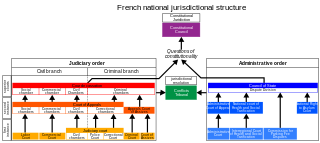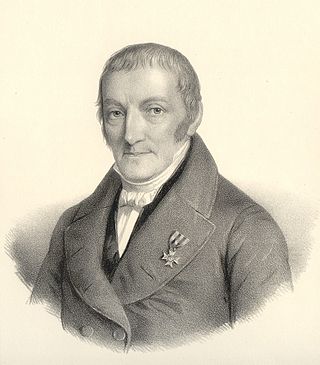
A constitution is the aggregate of fundamental principles or established precedents that constitute the legal basis of a polity, organization or other type of entity, and commonly determines how that entity is to be governed.

Friedrich Carl von Savigny was a German jurist and historian.

The primary and fundamental statement of laws in the Russian Federation is the Constitution of the Russian Federation. Statutes, like the Russian Civil Code and the Russian Criminal Code, are the predominant legal source of Russian laws.
The Bürgerliches Gesetzbuch, abbreviated BGB, is the civil code of Germany, codifying most generally-applicably private law. In development since 1881, it became effective on 1 January 1900, and was considered a massive and groundbreaking project.
The Egyptian Civil Code is the primary source of civil law for Egypt.
Rechtsstaat is a doctrine in continental European legal thinking, originating in Dutch and German jurisprudence. It can be translated into English as "rule of law", alternatively "legal state", state of law, "state of justice", or "state based on justice and integrity". It means that everyone is subjected to the law, especially governments.

Abd el-Razzak el-Sanhuri or ‘Abd al-Razzāq al-Sanhūrī was an Egyptian jurist, law professor, judge and politician. He is best remembered as the primary author of the revised Egyptian Civil Code of 1948. Al-Sanhūrī's multi-volume masterwork, Al-Wasīṭ fī sharḥ al-qānūn al-madanī al-jadīd, a comprehensive commentary on the Egyptian Civil Code of 1948 and on civil law more generally, published during 1952-1970, remains in print and is highly regarded in legal and juristic professions throughout the Arab world. Al-Sanhūrī was Minister of Education in the Cabinet of Mahmoud El Nokrashy Pasha from 1945-1946 and again from late 1946 to 1948.

French law has a dual jurisdictional system comprising private law, also known as judicial law, and public law.

Karl Ludwig von Haller was a Swiss jurist, statesman and political philosopher. He was the author of Restauration der Staatswissenschaft, a book which gave its namesake to the Restoration period after the Congress of Vienna, and which Georg Wilhelm Friedrich Hegel strongly criticized in §258 of Elements of the Philosophy of Right.
The Republic of Iraq's legal system is in a period of transition in light of the U.S.-led invasion in 2003 that led to the fall of the Ba'ath Party. Iraq does have a written constitution, as well as a civil, criminal and personal status law. In September 2008, the Iraqi Legal Database, a comprehensive database that makes all Iraqi positive law freely available to users online, was launched.
Legal science is one of the main components in civil law tradition.
The Law of Egypt consists of courts, offences, and various types of laws. Egypt has its own constitution which took effect on 18 January 2014. The Constitution of Egypt is the fundamental law of the country. Egypts legal codes and court operations are based primarily on British, Italian, and Napoleonic models, and has been the inspiration for the civil code for numerous other Middle Eastern jurisdictions, including Jordan, Bahrain, Qatar, pre-dictatorship kingdoms of Libya and Iraq, and the commercial code of Kuwait.

The political philosophy of Immanuel Kant (1724–1804) favoured a classical republican approach. In Perpetual Peace: A Philosophical Sketch (1795), Kant listed several conditions that he thought necessary for ending wars and creating a lasting peace. They included a world of constitutional republics by establishment of political community. His classical republican theory was extended in Doctrine of Right (1797), the first part of Metaphysics of Morals. At the end of the 20th century Kant's political philosophy had been enjoying a remarkable renaissance in English-speaking countries with more major studies in a few years than had appeared in the preceding many decades.

Law is a set of rules that are created and are enforceable by social or governmental institutions to regulate behavior, with its precise definition a matter of longstanding debate. It has been variously described as a science and as the art of justice. State-enforced laws can be made by a group legislature or by a single legislator, resulting in statutes; by the executive through decrees and regulations; or established by judges through precedent, usually in common law jurisdictions. Private individuals may create legally binding contracts, including arbitration agreements that adopt alternative ways of resolving disputes to standard court litigation. The creation of laws themselves may be influenced by a constitution, written or tacit, and the rights encoded therein. The law shapes politics, economics, history and society in various ways and also serves as a mediator of relations between people.
This is an index of articles in jurisprudence.
The Mixed Courts of Egypt were founded in October 1875 by the Khedive Isma'il Pasha. Designed by Nubar Nubarian Pasha to be part of the Khedive's great plans for Egypt, the Mixed Courts led to a radical reform of Egypt's chaotic nineteenth century legal system, where Consular courts competed with Government tribunals and religious courts for jurisdiction. The completion of the Suez Canal (1869) and the development of the cotton trade had attracted many foreign interests and foreign nationals to Egypt.
The rule according to a higher law is a statement which expresses that no law may be enforced by the government unless it conforms with certain universal principles of fairness, morality, and justice. Thus, the rule according to a higher law may serve as a practical legal criterion to qualify the instances of political or economical decision-making, when a government, even though acting in conformity with clearly defined and properly enacted law, still produces results which many observers find unfair or unjust.

The law of Libya has historically been influenced by Ottoman, French, Italian, and Egyptian sources. Under the Great Socialist People's Libyan Arab Jamahiriya, Libya has moved towards a legal system based on sharia, but with various deviations from it.
Constitutionalism is "a compound of ideas, attitudes, and patterns of behavior elaborating the principle that the authority of government derives from and is limited by a body of fundamental law".

Common good constitutionalism is a legal theory formulated by Harvard law professor Adrian Vermeule that asserts that "the central aim of the constitutional order is to promote good rule, not to 'protect liberty' as an end in itself". Vermeule describes it as an attempt to revive and develop the classical legal tradition by understanding enacted law as a positive application of background natural law principles. Within this tradition, he claims law is defined as "an ordinance of reason promulgated by political authorities for the common good." Vermeule states that law in this sense is "not tethered to particular written instruments of civil law or the will of the legislators who created them" but instead embody rational determinations of the common good, and it is those determinations, as well as the natural law background against which they are made, which constitute the law. Vermeule says that these principles include "a candid willingness to "legislate morality."









